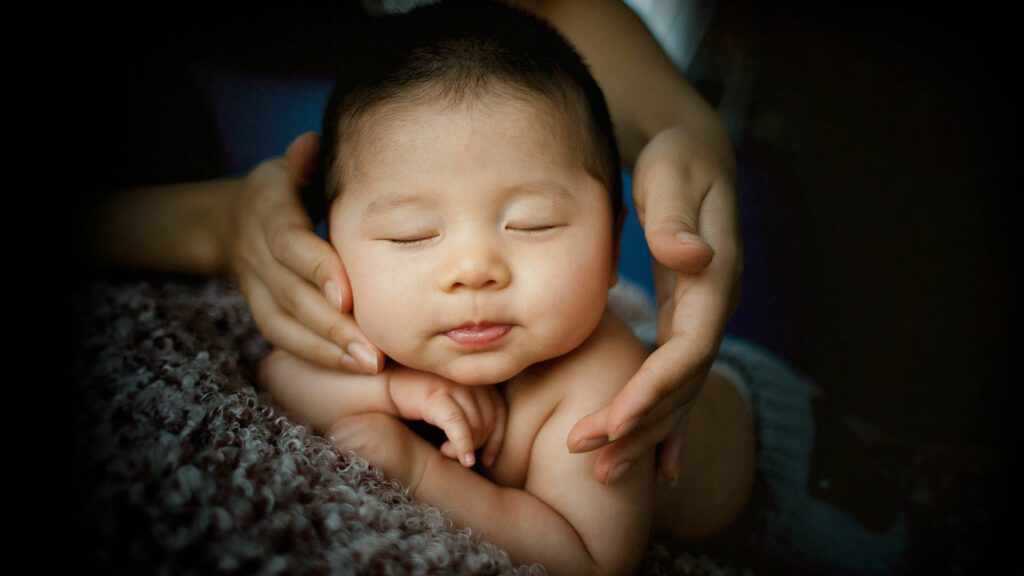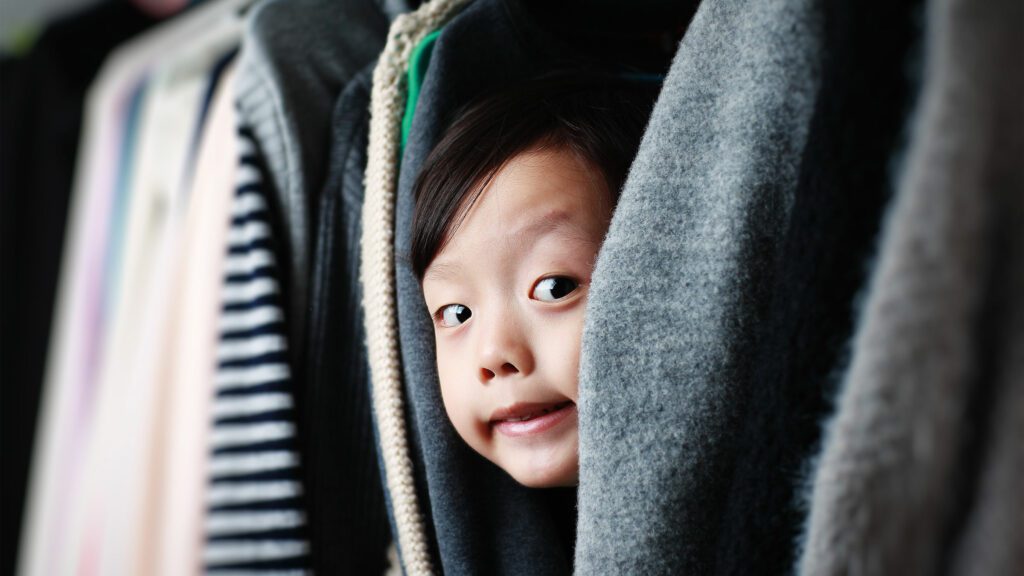Mindful Parenting Techniques for Babies
Anjali Sawhney on how to navigate the challenges of caring for a baby—and to more fully savor the joys.
The experience of nurturing a young life, entirely dependent on you (and perhaps your partner or family), is beautiful, but it also brings challenges. The transition from pregnancy, being the nongestational parent, or going through the adoption process to actually having a new baby (or babies) often involves sleepless nights, hormonal changes, juggling work, and facing many unknowns. Complex emotions from our own childhood can also surface. As much as our baby needs us, we may struggle to be fully present.
How can we find space for receptivity, respite, and relaxation when our days and thoughts are overflowing? The restorative time we once had for meditation, yoga, exercise, and socializing may no longer be available. It’s imperative to have sustainable practices that keep us present without adding more “to-dos” to our list. Mindfulness—being intentional about what is—can become one of your closest allies. It was for me.
I adopted my first child, Jai, from South Asia. After a year of paperwork, home visits, and more, it was finally time to meet my baby. I spent nearly two months in India while Jai’s visa was finalized, navigating several transitions along the way. My second child, Aanika, was biological, and since I was over thirty-five, the pregnancy was considered slightly high-risk. During this time, I experienced significant hormonal fluctuations and had to have a C-section, which temporarily limited my mobility.
What follows are some practices that helped me build resilience, allowing me to focus on my family and work. There are many practices that can be integrated into new parenting. The key is finding what brings ease to you and your family.
Loving-Kindness Meditation
As new parents, we can experience significant worry and anxiety, so loving-kindness meditation might be just what we need. When some of his monks were afraid in a forest, the Buddha taught them loving-kindness because love and fear cannot coexist. So, when you notice your mind is full of unease, take a few minutes (or more) to practice this meditation, which involves saying kind phrases as you bring to mind different people.
Start with wishing yourself well by quietly or out loud saying whatever phrases you feel are most loving. For example, you could say, “May I be happy. May I be healthy. May I feel safe.”
Then moving on to your baby and/or partner, say, “May you be happy. May you be healthy. May you feel safe.” Then, if you have time, say the phrases for a neutral person like the postwoman. And finally, if you’re open to it, say the phrases for someone difficult (who could also be one of the above).

Breathwork
Breathwork can offer an intentional connection to our physical state and the present moment. During the first year of my babies’ lives, when I found myself ruminating about the past or anxious about the future, I’d start by simply noticing my breathing and my baby’s breath. I then focused on where I was feeling it in my body. Finally, as needed, I’d elongate the exhalations with sound, often placing a hand on my belly. This activated my parasympathetic nervous system, promoting a sense of calm. Adding an intention to my inhalations and exhalations soothed me when I was particularly rattled. In turn, I could attend to the baby’s needs more clearly.
To practice intentional breaths, say the following phrases to yourself as you inhale and exhale:
Inhale: “I breathe in calm.”
Exhale: “I breathe out peace.”
Inhale: “I breathe in peace.”
Exhale: “I breathe out love.”
Keep breathing and repeating the phrases for a few minutes or more until you have created some spaciousness. Feel free to change the phrases to whatever resonates for you.
Engage the Senses
As a new parent, it was sometimes difficult for me to even notice my breath. My formal meditation practices, which had previously been helpful, fell away in the throes of exhaustion. My thoughts and actions often consumed me, whether it was something banal, like what to make for dinner, or something more complex. For example, while breastfeeding my daughter, I realized I was never breastfed myself. Instead, I spent the first two years of my life with relatives and a helper. This raised questions for me: Did my first years create an attachment disorder? What about the impact of not breastfeeding my son? Complicated emotions arose, and it became difficult to focus and bond with my baby.
To alleviate ruminating thoughts, a mindfulness meditation that I found effective was to intentionally engage the senses. I’d do this in our home while changing diapers, feeding the baby, or trying to put the baby to sleep. I’d focus on really noticing the texture of the diaper, the softness of my baby’s skin, the sound of my baby’s breath and coos, and observing tiny details as well as larger shapes around us. When I sipped water, I’d taste it and feel it going down my throat. Sometimes I threw mint into the water and felt it at the tip of my tongue.
Taking the sensory awareness practice into nature can be fruitful. During a ten-minute walk, I’d listen to birdsong, and it brought a smile to my face. I’d smell the flowers while feeling the weight of holding my baby. These excursions were so rejuvenating that I found it easier to stay present after returning home, which extended my sense of well-being.
Acceptance & Letting Go
Accepting things as they are and letting go of expectations sounds simple, but it’s not always easy. When I was a new parent, I began with small things, like not measuring my baby’s naps. Gradually, I surrendered as much as possible to my baby’s natural rhythm each day. This shift allowed me to be more relaxed about bigger milestones, such as when the baby should start crawling or teething.
To cultivate this practice, I labeled my thoughts as the baby went down to sleep. This exercise of “noting” helped me understand my thinking patterns and discern that thoughts and feelings come and go, allowing me to sense what was actually true in the present.
With noting practice, we observe distractions, and we label them to create space and avoid attachment. Whether seated in formal meditation or going about your day, you can practice noting by bringing awareness to thoughts, feelings, and sensations as they arise. You label them—and then let them go. Here are some example labels you might use:
Thinking: A general label for any thought.
Planning: When you notice you’re planning something.
Judging: When you catch yourself making assumptions.
Worrying: For anxious or negative thoughts.
Remembering: When recalling past events.
Feeling: For emotions like happiness, sadness, anger, etc.
Sensation: For physical reactions like tingling, tightness, warmth, etc.
As you experiment with these practices, notice what enlivens and restores you. It’s important to integrate mindfulness into your daily routine, rather than just turning to it when highly stressed, as the more mindfulness is practiced, the more automatic it becomes.
As you become aware of how much more space and ease you experience when you’re present, you will naturally become even more inspired to practice. Sometimes you’ll still find yourself on autopilot or acting unskillfully; that’s part of being human. Remember, amid the challenges and chaos, this is a miraculous journey of caring for a precious new life and expanding your beloved family.

Mindful Parenting Techniques for Young Children
Don’t dwell on your parenting missteps. Qalvy Grainzvolt on being kinder to yourself.
The average human adult makes around 34,000 decisions every day, including decisions about what and how much to eat, what to wear, and what to say. Most of these decisions are made automatically, based on information we’ve subconsciously stored about what we believe is “good” and “bad.” Parents and caregivers of young children must make decisions for themselves and for their children, so it’s easy to imagine how, for them, the sheer volume of decisions is particularly high.
What’s daunting, though, is not just the number of decisions involved in parenting, but also how much impact our decisions have on our children now—and for the rest of their lives. After all, children pay attention to everything, not only to what we do but how we do it, and they’re forming perhaps lifelong habits and beliefs around what they observe. This may feel like a lot of pressure. Fortunately, mindfulness, and even a Buddhist orientation, can offer us adaptive frameworks and best practices, helping us—moment by moment—to make the best decisions possible as we parent young children.
As a Buddhist chaplain for emergency services personnel such as police officers and firefighters, I’ve come to believe that, in many ways, we are all first responders in our own lives—especially those parenting during and beyond the Covid pandemic. Faced with myriad daily decisions ranging from minutiae to seismic needs, caring for young children may evoke in the caregiver an ethos of the compassionate warrior, one who embodies deep care and compassion while maintaining the parental instinct to protect and defend their child at all costs. However, our ability to truly embody the compassionate warrior may be fleeting at times (if not always!).
“Cultivate a response rather than surrendering to a reaction” is a core mantra I share in emergency services contexts. Finding agency, inner goodness, and expansiveness in any given moment—even in the milliseconds gained by taking an extra breath before responding to a stimulus—can be powerful. The ability to find this inner space is cultivated through meditation practice. Bringing focus toward the lower abdomen, toward your center of gravity and inner locus of control, can provide a somatic experience of inner balance while allowing your headspace to feel less crowded. This helps you connect with your goodness and authenticity.
The space created by taking a breath before reacting—before uttering a word or deciding how to engage—can allow a mindful moment to emerge. In such moments, the seeds of this mantra bear fruit. As parents or caregivers tending to many metaphorical fires—including navigating conflict de-escalation, meltdowns, and other age-appropriate episodes of emotional dysregulation, all while managing our own inner state—we recognize that we do not always show up to crises with a blank slate.
The practice of cultivating mindfulness gradually shapes our inner orientation. So, when a crisis arises and a flood of decisions rushes toward the shores of our mind and heart, we have some buffer space to better navigate our first response rather than falling into habitual and sometimes maladaptive reactions. Traits such as acceptance, compassion, and healthy communication skills can all be enhanced with a mindful orientation. This practice, valuable for first responders, can be equally powerful for parents of young children.
Parenting can feel like running a bed and breakfast for the same clients nonstop. Even writing about this topic stirs up emotions of profound inadequacy in me. None of us are perfect parents, and parenting is relentless. The constant need to dig deep within, despite fatigue and exasperation, coexisting alongside joy, happiness, and love, is a disorienting experience. Just as firehouses and police stations never sleep, parenting is a 24-7 enterprise.
A meaningful framework with a squarely Buddhist bent that has shown positive outcomes in spiritual care for first responders, particularly those who are parents, hails from the narrative arc of the Jataka stories. These traditional Buddhist tales explore the previous lives of the future historical Buddha—his journey over many lifetimes toward awakening. From these tales, we can come to appreciate that we too are on a journey. So, can we view each day as a lifetime? If we are all “buddhas in the rough,” as the Mahaparinirvana Sutra states, might we find more self-compassion by considering each day a new rebirth—an opportunity to strive for awakening, clarity, and the expression of our inner goodness amidst our unique intersectionalities?
The Jataka stories remind us that Siddhartha did not achieve enlightenment within a day. Perhaps, with this framework in mind, we might be kinder to ourselves. Too often, as parents and caregivers, we minimize the positive things we do as merely fulfilling our duty, while magnifying our missteps. If each day is a new rebirth where perfect, universal enlightenment may not yet manifest, but we still embrace our perfectly imperfect selves by performing bodhisattva deeds of care, we might find a way to navigate parenthood with greater balance amidst the 34,000-plus decisions that loom overhead each day.
As my spiritual teacher, Her Holiness Shinso Ito from the Shinnyo tradition, says: “There are no rehearsals in life. It’s natural to encounter failure when all you have is one shot, but every experience builds character as long as you are determined to rise again.”

Mindful Parenting Techniques for Teens
Nuanprang Snitbhan on how to help teenagers develop problem-solving skills and gain confidence.
I was born and raised in Bangkok. Then when I was fourteen, my parents sent me to the U.S. for school. When I first arrived, I struggled to learn English and assimilate into American culture. As a teenage girl, I remember desperately wanting to fit in, walking nervously into the cafeteria alone, and sitting in a biology class with no idea what the teacher was talking about.
That was my experience growing up. Everyone’s experience is different. But the teenage years have always been tough and are only becoming more so. Parenting a teen today is not as straightforward as it was in decades past. We have no map or precedent to navigate the many new challenges facing our children’s well-being, whether social, technological, or otherwise. But there are two areas to focus on that can make things a lot easier: taking care of ourselves as parents and helping to instill some essential qualities in our teens.
Even as a psychologist specializing in working with children and teens, my challenges are no different. Some days, I struggle to fight my own demons as my husband and I try to raise a happy, well-balanced, and confident daughter. I often have to face the fact that I only have so much control over who she will become over the years. There are many influences outside of my control, and she has her own karma that will unfold. Of course, I can be the best model and influence I can be, and that’s what I always come back to.
Given this, the first suggestion I can offer to parents is to be kind to yourselves. It’s important to take care of your heart as a parent because your sanity and well-being are crucial to you, your family, and other loved ones. This is easier said than done, but developing a daily self-compassion practice—which can definitely be done in conjunction with formal meditation—is essential to flourish amidst all the challenges we face as parents.
Every time you feel out of balance—sad, angry, disappointed, or guilty—remind yourself that this shall pass. When difficult moments come and emotions arise, instead of pushing them away, fighting them, or avoiding them, say, “Ha! You’re here. I’ve been waiting for you. This is hard, but my kiddo and I will be okay.”
Of course, you should educate yourself on the parenting choices you make, such as the increasing body of evidence that letting kids have smartphones before a certain age puts them at a developmental disadvantage. But beyond that, criticizing, comparing, or evaluating your parenting style, decision-making, or mistakes are the opposite of self-kindness.
One of the hardest parts of being a parent is watching my daughter struggle emotionally. Once, she came home in tears over her best friend. “Chloe was mean to me today,” she cried. My heart hurt seeing her in pain, and my first instinct was to fix it. I wanted everything to be smooth and easy for her.
But as a Buddhist practitioner, I’ve found that rather than always following my urges, I can practice being mindful by creating a space, even for a few seconds: pausing, checking in with myself, and listening to my body. When difficult moments occur, if I can focus on my breath before reacting to urges and fears, my daughter will have a chance to practice new skills.
Instead of letting my feelings rule the roost, I try to remind myself of the importance of letting my daughter learn to struggle on her own. When we’re in “fixer mode,” we might not fully hear the story, and our teens might not feel validated or heard. However, if we can let go of our urges and fears, we give them the opportunity to articulate their story. They learn to tolerate and be with difficult feelings and, with a little encouragement, can develop healthy problem-solving skills. These are crucial life skills we can offer if we, as parents, create a space within ourselves to pause and notice.
It’s also important to cultivate curiosity. As parents, we believe we know our kids, so it’s easy for us to make assumptions. Asking our teenage children to explain their point of view can reveal much more about their inner world. Like adults, young people deserve to be respected and heard. If we want them to develop their own agency and the ability to stand up for themselves, we should let them articulate what’s happening in their own words.
The challenges of technology and social media make it even more imperative that we help our teens develop an always curious mind. This mindset allows them to step back, stay open, wait, and discern rather than jumping to conclusions or taking everything at face value. A curious mind tones down negative self-talk because it engages inherent reflective abilities. The curious teen can stay mindful while learning to tolerate uncomfortable feelings about the unknown.
If teens feel safe and seen, they’re willing to open their hearts to explore what’s in front of them during difficult times. But they shut down or become reactive when feeling criticized, misunderstood, or attacked. When we as parents express curiosity about their intentions, behaviors, or decisions, we offer them the ability to self-reflect and increase their ability to tolerate discomfort. Feelings of discomfort are a part of being alive; they do not mean that something is wrong or needs to be fixed. Adopting an always curious attitude can foster confidence and trust, open more opportunities to connect, and strengthen your relationship with your teenage kids.

Mindful Parenting Techniques for Grown Children
Parenting grown children requires a middle path, says Ellen Hamada Crane sensei. They need you to keep nurturing them and to let them go.
Becoming a Buddhist priest was as much a surprise to me as it was for everyone who knew me. I grew up as a Shin Buddhist, taught elementary school, became a criminal defense lawyer, married a Catholic, and raised three sons attending a neighborhood Catholic church. My path back to the buddhadharma was in response to a family crisis and a search to find deeper meaning in my life.
Being a parent of adult children, now ages thirty-six to forty, is a delicate balancing act, requiring respect, sensitivity, and love. I’ve been treading that path for a while now, sometimes with great difficulty. Gratefully, the Buddhist teachings have given me a way to support my children with compassion, acceptance, and a deeper understanding of their needs.
What follows are the seven things I’ve learned about supporting and loving adult children.
Unconditional Love
Continuing to love, care for, and nurture my sons is crucial to maintaining the healthy relationship I have with them. This foundation assures them that my love for them is unconditional, no matter what. This was crucial when dealing with substance abuse issues. In spite of challenges that included anger, frustration, and hurt emotions, they’ve never doubted that they’re cherished.
That said, I’ve had to be careful not to fall into unhealthy codependency and enabling. This has required setting boundaries and limits, which is sometimes called “Tough Love.”
Respect and Nonjudgment
Two important keys for me are respecting my sons’ decisions and being as nonjudgmental as possible. I trust them to be responsible and accountable for their own lives. Sometimes their decisions don’t work out, and the urge to rescue is undeniable. Standing by as they fail is sometimes my greatest contribution to their growth and maturity. From these failures come invaluable life lessons in understanding the Buddhist truths of impermanence and interdependence.
None of my sons pursued careers my husband and I had hoped for them as children. Instead, each one has found a path that suits his unique interests and temperament. I’m moderately secure in the fact that I did not push them too hard in any one direction.
Nonattachment and Being Present
It’s difficult to watch when my sons struggle to move forward in their lives or to cope with disappointment. But Buddhism has been very helpful in teaching me the value of nonattachment, which is completely different from detachment. Nonattachment is about focusing on the situation at hand and not being attached to a specific outcome. Detachment has connotations of not caring and nihilism.
An enormously valuable parenting skill has been helping my sons learn to deal with what is in front of them, right now, without judgment or expectation of a desired outcome. They’ve each received the valuable life lessons of putting forth their best effort, being fully present, and not focusing on the result.
One of my sons was a recruited college athlete; however, his four years as a collegiate teammate were fraught with frustration. To his credit, he never quit, continued to work hard, and earned the respect of his teammates.
Be an Honest Listener
When my sons are struggling, I make every effort to engage them in an honest and straightforward discussion, help them consider options, and offer opinions if they want them. Often, the most helpful strategy is just being open to having a conversation and listening.
“Family dinner” is a tradition we practice once a week, with our two sons who live nearby. Our weekly dinner is a time to catch up and find out what’s going on in their lives. It’s a wonderful way for us to stay connected and close, and they know my husband and I will always listen to them. Thank goodness for texting, Zoom, and FaceTime for keeping in touch with my third son who lives across the country.
Let Go of Control
As a parent, it’s easy to get used to being in charge, making decisions, and controlling outcomes. For my adult children, as a wise parent, I step back and try not to argue, coerce, or manipulate. My goal is to maintain a long-term, loving, and harmonious relationship with my children, allowing them to be themselves.
As a parent, I will, of course, have my own opinion and will freely offer my sons the “benefit” of my wisdom, but ultimately, I’m here to support and encourage them in what they want to do. When my children moved into adulthood, that was the time to let go and let them live their lives. I sometimes have a harder time doing this than they do, but it’s truly good for all of us. They’re adults; recognizing this is part of coming to terms with reality as it is.
Let Go of Guilt
Another issue I’ve learned to put behind me is guilt, feeling responsible for a bad situation. Sometimes despite my best intentions, or sometimes because of them, things go awry. Buddhism teaches that things arise and fall away as the result of myriad causes and conditions, too innumerable to count. Consequently, not one thing is the cause of anything. This doesn’t absolve me or anyone else from some responsibility for a situation, but it’s wise to keep in mind that many factors contributed, because that’s the actual reality.
Find Meaning in All of Life
Moving forward, learning from my mistakes, and allowing my adult children to make their own mistakes, I use life’s challenges as important tools for self-reflection and self-awareness. Awakening comes from answering the question, “Who am I?” As a parent I try to guide my children to answer that question for themselves. In my life, both my sons and the Buddhist teachings are incredible gifts.




